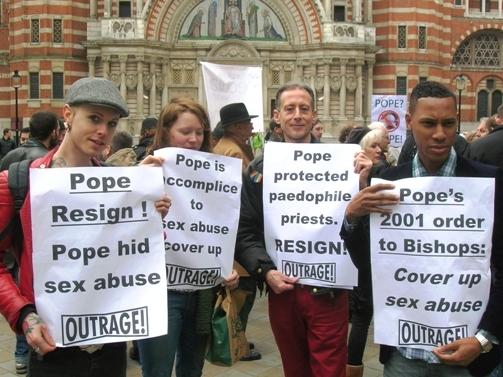"The church shouldn't be interfering in the personal and private lives of people - we don't own them." The comment comes from a Catholic priest working with abused children in the Philippines, Father Shay Cullen. It would be good to hear from other men or women of God rather more liberal than Pope Benedict XVI, for whose visit to Britain later this week this programme sounds no trumpets. Apparently few priests or bishops would speak to human rights campaigner Peter Tatchell, so his is the talking head we see rather too much of here. But that's the personality-driven world of TV for you, and by and large he makes his points.
I worried at first that Tatchell was going to be sketchy over chapter and verse. When minutes into the programme he ominously declared about Ratzinger, "This man has form," and skimmed over the 2001 letter in which the Pope adjured his bishops to secrecy over cases of child abuse, my first reaction was, "Well, quote it." And then, in a few seconds, Caroline O'Reilly of Catholic Voices - one of the few organisations who agreed to speak to Tatchell - was given a tiny slot to start putting it in the context of internal processes. Not long enough; you'll need to read Geoffrey Robertson QC's Penguin Special for the finer points.
Understandably, many viewers are going to want to know what Tatchell grasps of canon law, or whether he's read any of the Pope's more complex reasonings. For the purposes of this programme, which attempts to put some of Benedict's more unfortunate statements and failures to speak out in the context of democracy, liberty and social justice, it's surely irrelevant.
The format of the programme, though not its lack of detail, has something of Tatchell's quiet eloquence in his press releases. As a speaker to camera wandering the world on a mission, he's not quite so impressive. But he does structure the short time available well. From the general introduction focusing on the issue that's given the Catholic Church most grief recently, and over which the Vatican, if not the Church in England, seems inadequately to share its victims' grieving, we travel from London via America to Germany. Ratzinger's co-professor in theology at Tübingen University, Hans Kung, pinpoints the moment at which his then-progressive colleague and "inspiring teacher" parted company from the liberal agenda of Vatican II and reverted to his conservative Bavarian roots: it was, he claims, the invasion of the lecture room by rioting students in 1968.
Fast forward to 1981, when Cardinal Ratzinger becomes Prefect of the Congregation for the Doctrine of Faith, formerly known as the Inquisition. It's a bit tittle-tattly to report his reputation as "God's rottweiler" without citing the source, but we at least have Kung to hand to tell us how the present Pope assembled bishops around him who all thought exactly as he did.
Cue Tatchell's attack on the "most shameful" act of his recent leadership - the way in which, in 2009, he revoked his predecessor's excommunication of the extreme Right bishops of the Society of St Pius X. We don't need Tatchell to tell us that the reception of Holocaust-denier Richard Williamson back into the fold was an "insult" - that's expressed perfectly well by one of the two young Jesuses in the Oberammergau Passion Play. But the more complicated fact that Williamson isn't allowed to practise as a bishop unless he revokes gets a little pushed to one side.
Tatchell's homing in on Manila looks as if it's going to be broad-brushstroke time again. But the slum-dwelling mother of 10 who's told by her priests to have as many children as she can, because if she doesn't it's a sin, makes a simple point perfectly well. A lawyer advising bishops on their case against birth control falls glibly into the trap about holey condoms; a health worker calmly expresses disbelief at the victimisation of doctors and ministers in the Government's anti-AIDS campaign; and Father Cullen makes the necessary point about Varican pomp and ceremony simply by citing Christ's, "I came to serve and not to be served."
That leaves precious little time for the last quarter back in the UK. Arguments for and against stem cell research glide into a thumbnail sketch of the idiosyncratic Cardinal Newman, whose adoption by the Pope as a conservative figure is going to cause a lot of trouble later this week. We get two pithy quotations from John Henry here, one about the unaccountable intensity of Father Ambrose St John's love for him - whether it was sexual or not is unprovable and irrelevant - the other his toast to "conscience first and the Pope afterwards".
And only now, cannily towards the end, Tatchell's supposed hobby horse, the Pope's condemnation of homosexuality whether acted upon or not as "a strong tendency towards an intrinsic moral evil". You may feel he's bullying a renascent O'Reilly over this one, but this time she doesn't come out of the encounter so well. And finally the punchline: "This is not a pope we should be welcoming to Britain." Will anyone now stand up on television and argue intelligently for an hour on why we should? Would Father Cullen, perhaps, like to make the case for Vatican III?















Add comment